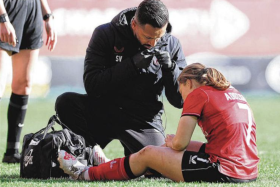TCM can be tailored to your kids: Expert
Cold, indigestion among ailments TCM can treat
Besides Western medication, an alternative method for parents to consider when treating their sick children is traditional Chinese medicine (TCM).
According to physician Tan Wen Jia of Eu Yan Sang TCM Clinic at Simei and Bedok MRT station and Eu Yan Sang TCM Wellness Clinic at Plaza Singapura, respiratory and gastrointestinal conditions such as chronic cough, colds, poor appetite and indigestion are among the most common ailments suffered by children here.
They often can be effectively treated or managed with TCM, usually through herbal medication or external non-invasive therapy in the form of paediatric tui na.
This also extends to other conditions such as lethargy, fitful sleep and bedwetting.
Ms Tan said a common myth parents have about TCM is that their child is too young for it. While most young patients are between three and 12, TCM is not limited to any age.
Paediatric tui na - a specialised therapeutic massage using gentle and safe techniques in which acupoints are stimulated to treat illnesses, strengthen the body or improve immunity - is most effective for children under six.
TAILORED
Ms Tan told The New Paper: "Treatment is tailored to the child's age and body condition and is suitable even for babies."
Since 2014, the company has seen an increase in paediatric tui na patients who are 12 years and below by more than 100 per cent, said Ms Caryn Peh, managing director of group clinic services at Eu Yan Sang Integrative Health.
Dedicated child-friendly Eu Yan Sang clinics are located at Bukit Batok, Bukit Panjang, Jurong Gateway, Punggol, Sembawang, Sengkang, Simei and Tiong Bahru.
According to Ms Tan, complementing Western therapies with TCM has also become more commonplace.
For instance, in treating allergic rhinitis, also known as hay fever, antihistamines, decongestants or nasal sprays can offer quick relief from symptoms of runny nose, sneezing and congestion.
TCM treatments will target the root cause of hay fever that may be lung, spleen or kidney deficiencies, to strengthen the body.
Ms Tan's advice is to inform both the paediatrician and TCM physician about the treatments and medication the child is on, and to take TCM medicine at least two hours apart from Western medication or supplements
TCM practises a proactive, holistic approach to health, focuses on well being and seeks to prevent illness from occurring, or recurring, by correcting imbalances in the body.
Although minor health issues such as poor appetite and fitful sleep may not warrant a visit to the doctor, they may affect a child's growth and development if left untreated, said Ms Tan.
However, in serious cases such as high fever, severe vomiting or diarrhoea, Western treatment is advised so as not to delay treatment.
Contrary to popular belief, not all traditional Chinese medications taste bitter.
Different herbs are prescribed for each condition, and these herbal concoctions can even taste sweet.
Parents whose children are not used to consuming herbal medicine can add honey or use an oral syringe to avoid the taste buds.
TCM medicine is also readily available in the form of powder, pills and tablets to suit a child's needs.
Said Ms Tan: "Safety is a concern of many parents when first trying out TCM. When prescribed correctly by a registered trained physician, TCM is a relatively safe treatment.
"When seeing a TCM physician, fully inform your physician about your child's condition, including any medical history, food and drug allergies and other medical treatments.
"You can also check with your physician to better understand what to expect during the course of treatment."
Get The New Paper on your phone with the free TNP app. Download from the Apple App Store or Google Play Store now


